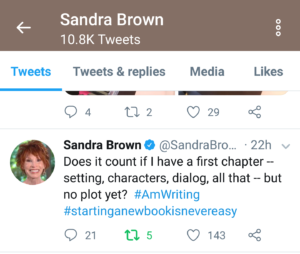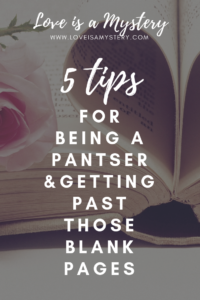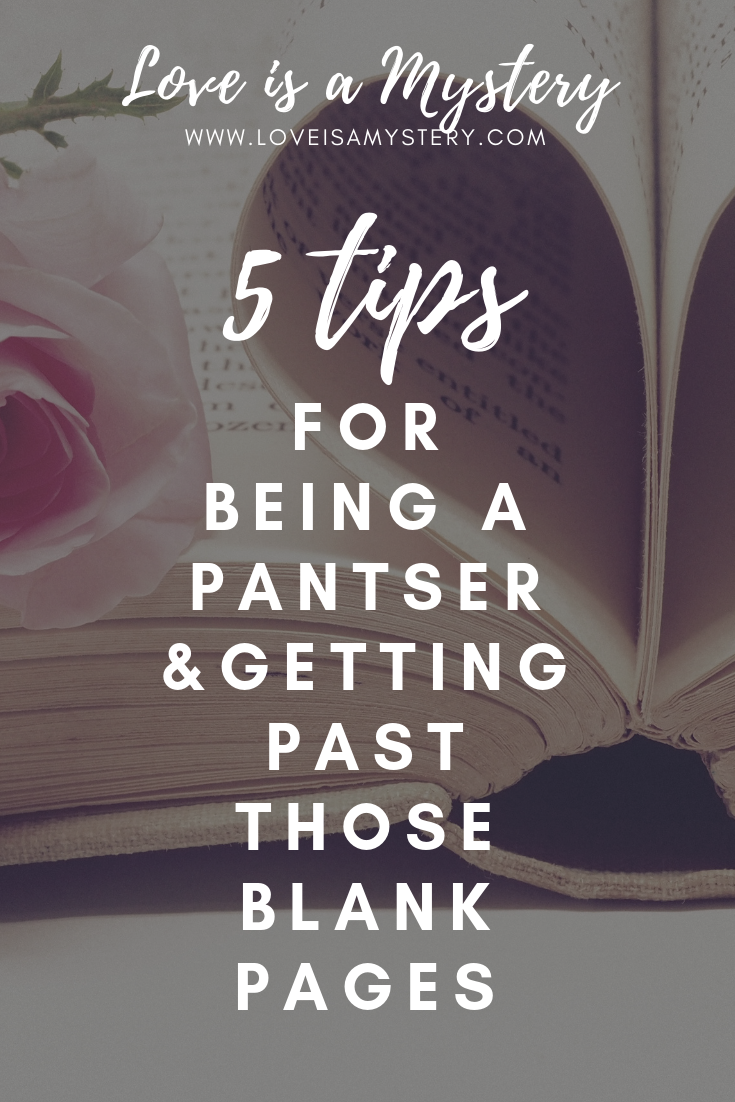What’s worse than staring at a blank page? Staring at a page that has a few words on it but you have no idea what will happen next.

Staring at a blank page and wondering what to write next is definitely not rosy.
Ah, the life of a pantser. One who doesn’t plot or plan their story but starts writing first. It’s not something I love. Believe me, I’ve changed my ways and tried to plot and it rips apart my motivation for that particular story unless and until I am about halfway through, when I finally stop writing to plot a little. I’m sure it’s the same way for a plotter. How could they ever sit down and write without knowing where the story is going?
Being a pantser to me means trusting your character to tell you where to take the story. It’s tough. There’s often a battle when I’m not sure I understand the character. I often ask: “Why in the world would you do that?” Especially with my current work-in-progress. The heroine keeps surprising me, but if I don’t do what she says I will get stuck. Believe me, I know because I have been in that position. And it sucks.
Then again, it’s always whatever work-in-progress I’m writing at the time that is giving me problems.
And although it sounds miserable (it often is) it’s also one of the most satisfying moments of my writing. I start out, I write, and I have no idea what’s going to happen. It’s even better when I’m hit with a sudden idea and can’t write it down fast enough. Unfortunately for me, that’s rare.
But oh, these characters I’m writing now. As a writer who pants and rarely plans, I’ve learned you often have to woo your character to come out of “hiding” and speak to you.
So how do I do that?

If you’ve seen my blog, you know how much I love character development. Most of my character development goes far above and beyond what I’ve shared. It’d probably bore you to tears if I shared it all. The interview questions, the dossiers, the photo collages that I create until I finally create a small “cheat sheet” that you might have seen on my blog. To me, that’s my plotting. My characters often change from my original creation, but that’s my way of plotting.
“Character development, to me, is my way of plotting.”
Just write. If you saw my first draft of my first few scenes in my current WIP, all you’d see is a lot of dialogue. I don’t have emotion or even setting at this point. I’m focused on the characters and action. Rewriting is where I’ll go in and add all the layers, the action, setting, emotion, even dialogue tags. At this point, because it’s a new story, I can’t try too hard. These characters are still shy and don’t trust me to tell their story yet. (Yes, that probably sounds cuckoo to non-writers, but it is the way things are.)
“These characters are still shy and don’t trust me to tell their story yet.”
The other day, I got a thrill when I saw Sandra Brown’s tweet:

And I am like OMG yes! Sandra Brown, one of my favorite authors of all time, has to start new books just like the rest of us. With a blank page! I mean, I already knew this, but seeing her honestly was such a huge inspiration. And yes, this absolutely counts!
There are all kinds of books and workshops out there about plotting. I love Mary Buckham and what she does, and she offers a plotting workshop that is likely out of this world. I’ve never taken it. Most of these plotting workshops promise to change your writing world, make you a better, faster writer. If I were to take one, I’d probably take hers. But I have to use my experience and avoid plotting at this point at all costs. Once I write the first few scenes or chapters, I can stop and take a good long look at what’s happening but for now if I do that, I will lose a lot of time because I will get too stuck to move. The characters stop whispering.
The other key to writing as a pantser is to read. A lot. Read something so unlike what are writing at the moment.
“Read. A lot. Read something so unlike what you write.”
In my opinion, and maybe it’s because I don’t have a lot of experience as a plotter, but it’s easier to get writer’s block as a pantser. I believe that writer’s block happens when I’m trying to tell the story I want to tell instead of the story my characters want to tell.
In my recently finished novel, which is with my editor at the moment, the very first scene had a sex scene. So unlike most of my writing, but these two characters had a history. I didn’t want to write it. I didn’t write it at first. I ignored my characters because I was too scared to write something so bold. You know what happened?
I got blocked! I got so stuck on that story I couldn’t move forward. At all. Until I went back and rewrote the scene the characters wanted (and I added the sex).
“Writer’s block happens to me when I’m trying to write the story my way instead of how the characters want me to tell it.”
My fifth key to being a pantser and getting past that blank page is the most difficult. Take a breath, take a break, clear your mind, meditate.

We’ve all heard how great meditation is, but it’s hard to stop long enough or be in the mood etc. I’m here to tell you that even 2 minutes of sitting with your eyes closed, no noise, no phone nearby, no interruptions is the best thing you can do for your mental health and getting things out of your head and onto the page. More than two minutes if you can. Because when you have a lot of noise going on in your head, how in the world can you hear anything?
“Take a breath, take a break, clear your mind, meditate.”
To sum it up, my five tips for being a pantser and getting past those blank pages:
- Develop your characters.
- Listen to your characters.
- Read something unlike what you are writing.
- Don’t let fear stop you from writing your story.
- Meditate.
What do you think? Do you have any tips you want to share that work for you? Any questions?



Great post! I’m a pantser too. It is exhilarating on good days. I write in first person at times just to get into the character, then change it later. I also meditate.
Great tips. Love the idea of writing in first person. And meditation is always great!